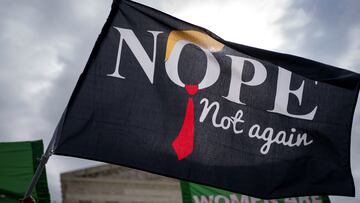What are the Supreme Court’s reasons for rejecting Trump’s claims of immunity?
The Supreme Court justices heard oral arguments Thursday on Trump’s claim of absolute immunity for US presidents. They seemed skeptical about that notion.

Lawyers for Donald Trump and Special Counsel Jack Smith presented oral arguments at the US Supreme Court on Thursday. The justices are being asked to decide if the former president has “blanket criminal immunity” from prosecution for any official acts that he took as president.
While the justices seemed skeptical of the “absolute immunity” put forth by John Sauer, the lawyer arguing for Trump, the conservative majority did seem inclined to the idea that some level of immunity is necessary. The decision, when it is handed down, could see the scope of Smith’s case against Trump for conspiring to overturn his 2020 election loss to Joe Biden narrowed but is unlikely to be thrown out.
What are the Supreme Court’s reasons for rejecting Trump’s claims of immunity?
During the more than two-and-a-half hours of arguments, the Supreme Court justices presented a series of hypothetical questions about whether immunity would apply to certain actions that could be taken by a president while in office. These included accepting bribes for granting official posts, selling nuclear secrets to adversaries or ordering a political assassination or a coup.
Some of those Trump’s attorney considered private acts, even though hypothetically carried out in the president’s official capacity, and could be criminally prosecuted to an extent. However, in the case of an official act, a president would need to be impeached and convicted by Congress before he could be criminally prosecuted once out of office, and only if there were a statute saying the officaial act in question was a crime.
The majority of the Supreme Court justices appeared not to buy Sauer’s argument that a president should have absolute immunity from criminal prosecution for official acts upon leaving office. Justice Jackson asked “If the potential for criminal liability is taken off the table, wouldn’t there be a significant risk that future presidents would be emboldened to commit crimes with abandon while they’re in office?”
However, several members of the Republican-appointed majority did seem receptive to the notion that presidents require some immunity.
Justice Samuel Alito expressed concerns that incumbent presidents who lost a close, hotly contested re-election could be in a “peculiarly precarious position” upon leaving office if they are “subject to criminal laws just like anyone else.” Instead of being able to “go off into a peaceful retirement” the president in question “may be criminally prosecuted by a bitter political opponent.” Alito queried if that wouldn’t “lead us into a cycle that destabilizes the functioning of our country as a democracy?”
Chief Justice John Roberts for his part was concerned that the court of appeals decision which the justices are reviewing “did not get into a focused consideration of what acts we’re talking about.” He and other conservative justices seemed to favor sending the case back to the lower courts where further analysis could be performed on what acts if any may deserve some immunity.






